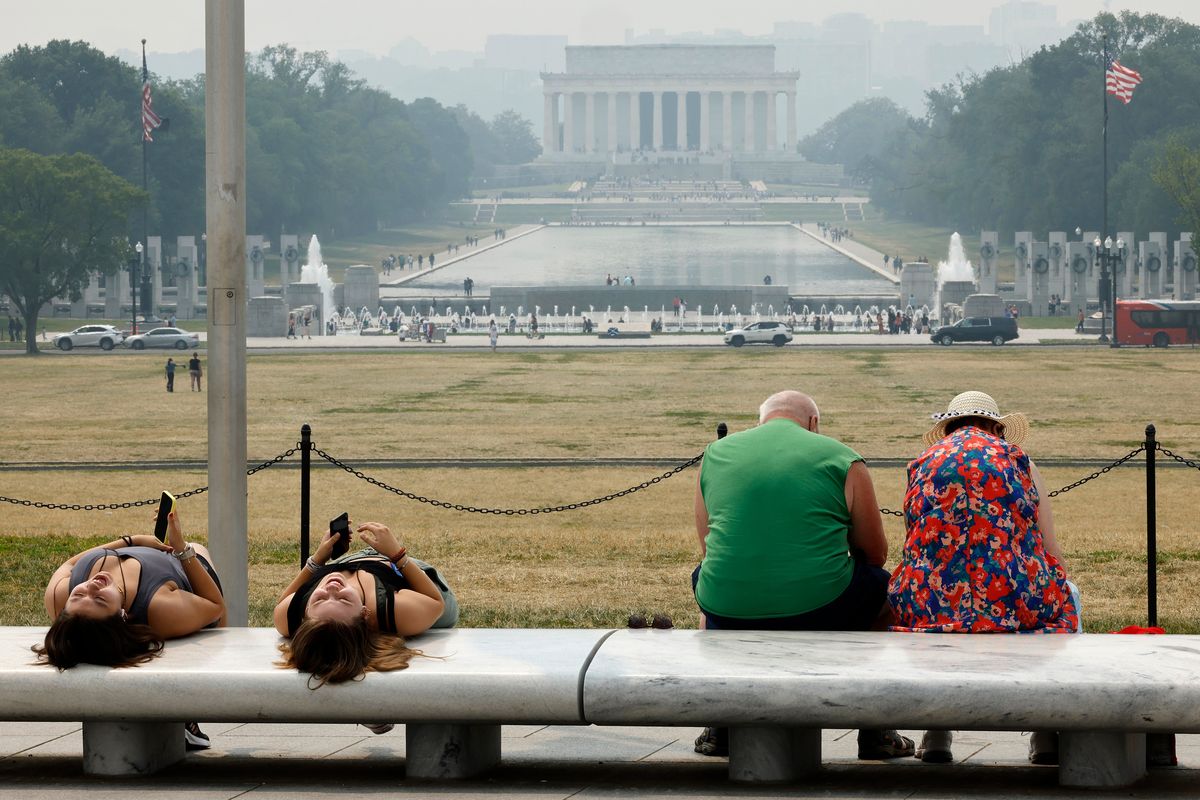As historic smoke blankets the East Coast, Northwest leaders hope Congress will wake up to the wildfire threat

WASHINGTON – The nation’s capital woke up Thursday to the impact of catastrophic wildfires – perhaps in more ways than one – as smoke from nearly 10 million acres ablaze in Canada blanketed the East Coast.
The District of Columbia was under a “code purple” alert on the U.S. Air Quality Index – higher than code red, indicating it had “very unhealthy” air – when the Senate Committee on Energy and Natural Resources convened a well-timed hearing Thursday morning on the federal response to wildfires. Senators on the panel from Washington and Idaho said they hoped the eye-stinging haze would spur Congress to act on proposals aimed at addressing a problem that has at times been treated as too parochial to be a federal priority.
“I think America is waking up, at least on the East Coast, to this problem,” said Sen. Maria Cantwell, D-Wash. “We certainly have known all about it on the West Coast for some time now, and I think that it is a time and opportunity for us to really break down the barriers that are prohibiting us from having a faster response.”

Sen. Jim Risch, R-Idaho, echoed that sentiment, and called on his colleagues to pass several bills he has sponsored to accelerate prescribed burns and other forest management practices that have been shown to reduce the risk of extreme fires.
“For those of you who live on the East Coast, welcome to our air in the West,” Risch said. “This is common. I don’t remember a summer in Boise when we haven’t had smoke.”
The Washington Nationals postponed their game Thursday, and the White House delayed a Pride Month celebration as smoke drifted across the Northeast. More than 100 million Americans were under Air Quality Index alerts, according to the White House, due to the smoke from one of Canada’s worst wildfire seasons on record. More than 425 active wildfires had burned nearly 10 million acres in the United States’ neighbor to the north, 17 times the country’s average over the past two decades.
The National Interagency Fire Center was sending more than 600 federal and state wildland firefighters and support personnel to help control the fires in Canada, the White House said. With the U.S. fire season just beginning, Cantwell showed the committee the latest assessment from the Boise-based agency, which projects that nearly all of Washington state will be facing “above normal” risk of wildfires by July.

While Democrats emphasized the role climate change plays in worsening fire seasons and Republicans stressed the need to ramp up timber projects and other forest management practices, the hearing highlighted areas of bipartisan agreement. One proposal with support from both parties in the House and Senate would expand the “Good Neighbor Authority” program that lets states, tribes and counties remove trees and other fuels from federal land with the federal government’s approval.
As they questioned witnesses from the Interior Department and U.S. Forest Service, Democrats also called for Congress to fully fund President Joe Biden’s budget request for those agencies, which would give wildland firefighters a permanent pay hike and provide additional funding for their mental and physical health. It would also fund affordable housing for those workers and increase funding to the Forest Service and Interior Department.
Jeffrey Rupert, the director of the Interior Department’s Office of Wildland Fire, told the senators hotter climates have dried out wood and other fuels, which his agency wants to remove more of through prescribed burns, timber harvesting and other methods.
“We go through these periods of extreme drought,” Rupert said. “That absolutely is a huge part of driving these catastrophic mega-fires that we’re experiencing.”
Cantwell urged federal agencies to adopt communication technologies that could help speed their response to wildfires. She also advocated more prescribed burns, noting that opposition to setting small, controlled fires to remove fuel can be counterproductive.
“People were like, ‘Well, there will be some smoke,’ ” she said, describing opponents of the practice. “Well, because we’re not doing prescribed burns, we’re getting a whole lot of smoke, OK? So the point is, let’s change our management system response so that we can reduce fire risk. This summer is telling us we need to do that now.”
Risch, who earned a bachelor’s degree in forestry from the University of Idaho, urged Congress to change regulations that environmentalists have used to slow or block timber projects and noted that wildfires are a natural part of the landscape of the West.
“For years, we have focused on putting out fires,” he said. “And by being successful at it, we’ve caused the problem that we’ve got.”
In the House, Rep. Cathy McMorris Rodgers, R-Spokane, released a statement Thursday calling for Congress to act.
“The wildfire smoke blanketing the East Coast of the United States is an unfortunate reminder of what we have dealt with in Eastern Washington – every single summer – for decades,” she said. “With this issue getting more national attention, it is a call to work together on solutions like supporting proactive and collaborative forest management, which I’ve led on for years, to prevent catastrophic wildfires in the United States. Ensuring our forests are healthy is the key to keeping our communities safe and helping shield everyone from the harms of poor air quality.”